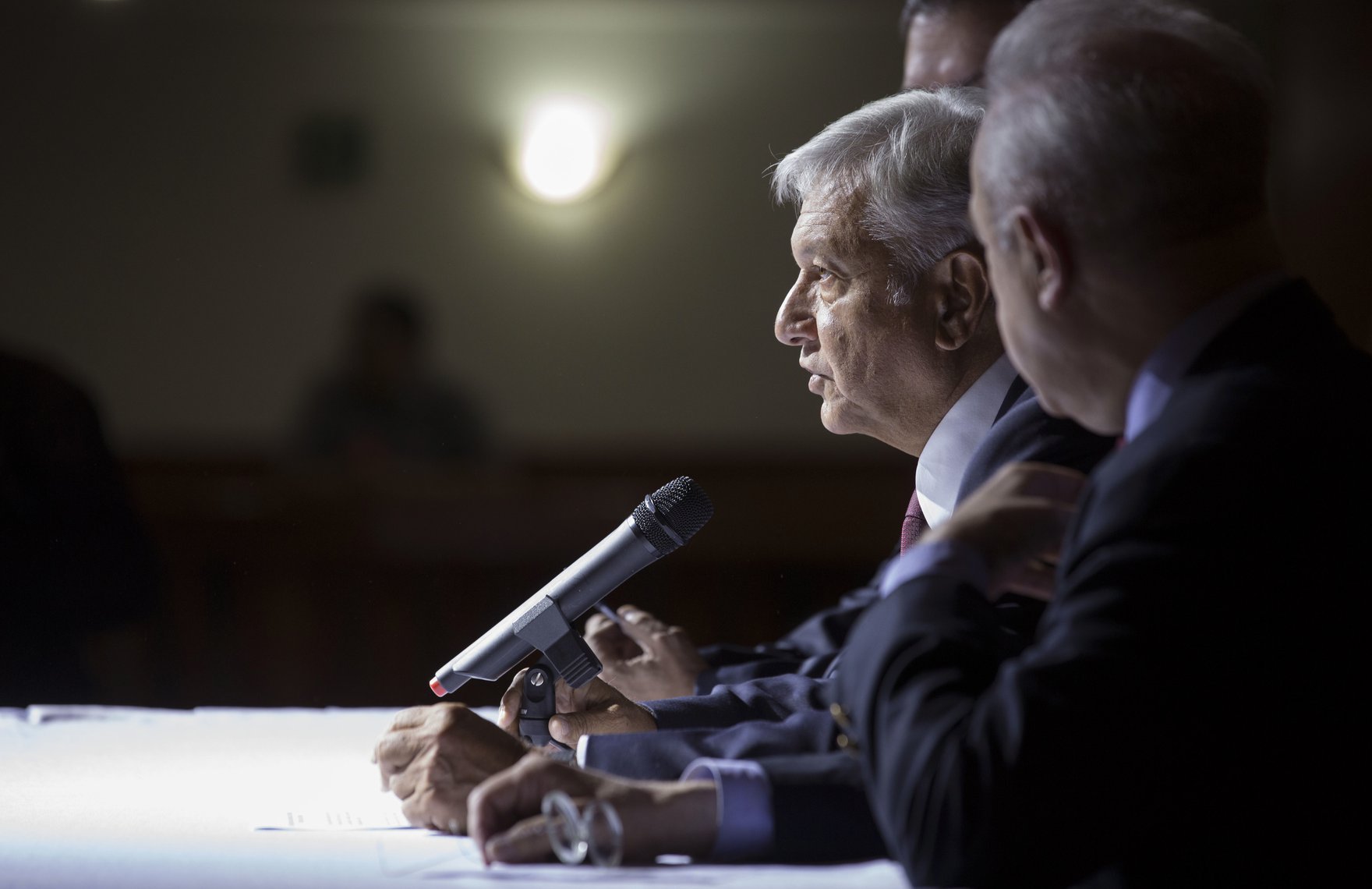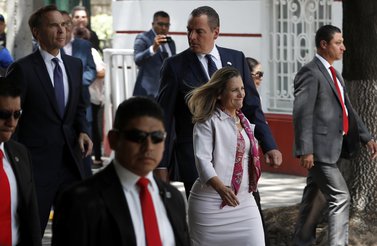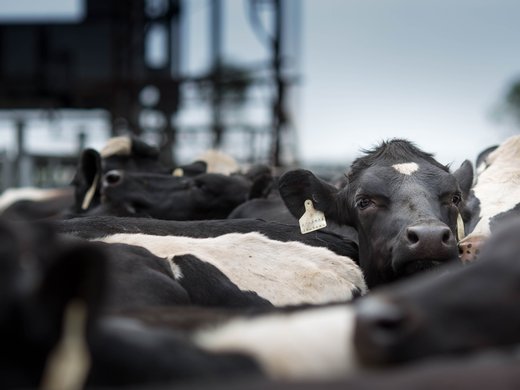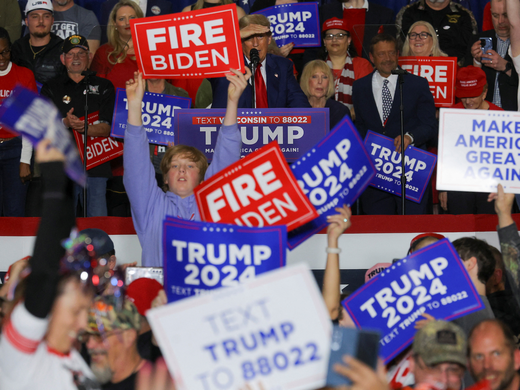Andrés Manuel López Obrador has never minced his words when addressing US President Donald Trump — until now, that is.
“I think that it is worth making an effort to conclude the renegotiation of the North American Free Trade Agreement [NAFTA],” López Obrador wrote in a letter to Trump, made public on July 22. He closed the letter comparing himself to Trump: “We both managed to put our voters and citizens at the center and displace the establishment or prevailing regime.”
The Mexican president-elect struck a remarkably conciliatory tone for a politician who wrote a book titled Oye, Trump (Listen up, Trump!) following the 2016 election. But the letter did little to resolve the doubts that swirl around NAFTA renegotiations, which resumed on July 26 in Washington, DC. The negotiations are the first important test for what is bound to be a fraught relationship between the two anti-establishment politicians.
López Obrador ran on a platform of reducing economic inequality and ending corruption. In the past he has been a harsh critic of NAFTA, saying it is a bad deal for Mexican farmers and workers. He has also criticized the 2013 energy reforms, which opened the Mexican energy sector to foreign investment. Yet, his chief NAFTA negotiator says that he will stay the course to reach a deal quickly, rather than introduce new provisions. Energy and agriculture, two sectors where domestic and foreign policy are inextricable, have taken a back seat in López Obrador’s trade dealings.
“López Obrador’s perspective changed in recent years because he saw the potential damage of losing NAFTA for the Mexican economy,” says Diego Castañeda, an economist and an adviser to Mexican Senator Mario Delgado. “Especially in the short term that forces him to take a more conventional posture.”
Now López Obrador will have to reconcile his anti-establishment, pro-poor rhetoric with the exigencies of global trade and a volatile United States-Mexico relationship.
López Obrador’s Broad Coalition Must Deliver
López Obrador’s long path to the presidency began in the southern state of Tabasco. His grassroots support base in Southern Mexico — farmers, low-wage workers and young people — has been a constant in his journey from local politics to three consecutive presidential campaigns.
But, to be elected president, López Obrador also had to win support in the industrialized northern states, which have rarely supported left-wing politicians. On the campaign trail, he struck a careful balance between championing the redistributive policies that are his calling card (university scholarships, cutting government salaries) and appealing to residents of states in northern Mexico and the Bajío region, which have seen more of the benefits of free trade and industrialization.
“[The north] is the region that’s most integrated with the US economy,” says Castañeda, who advised Senator Delgado when he served on the Senate commission for both NAFTA and the Trans-Pacific Partnership. “Running on a platform of ‘We’re going to leave NAFTA’ would have been very unpopular in the north [of Mexico].”
The calculation paid off, and López Obrador won with an impressive 53 percent of the vote in a field of four. He won the majority in all but one of Mexico’s 32 states. A diverse mix of voters, from rural farmers to urban skilled workers, will be holding López Obrador accountable for his campaign promises.
López Obrador named Jesús Seade — a former International Monetary Fund adviser who represented Mexico in negotiations of the General Agreement on Tariffs and Trade — as his chief negotiator for NAFTA. Seade will collaborate with the outgoing negotiators until López Obrador takes office on December 1. Questioned during the Summit of the Pacific Alliance on July 23, Seade said, “Resolving and advancing the [North American] Free Trade Agreement is a high priority, and we’re going to achieve it.”
In his response to López Obrador’s letter, Trump increased the pressure surrounding the negotiations.
“I believe a successful renegotiation of the North American Free Trade Agreement will lead to even more jobs and higher wages for hard-working American and Mexican workers,” Trump wrote, “but only if it can go quickly, because otherwise I must take a much different route.”
The draft NAFTA text is private, but most public debate about the negotiations has focused on issues such as metal tariffs and automotive manufacturing. Some core issues of López Obrador’s campaign, such as agriculture, have been out of the spotlight. López Obrador campaigned on food self-sufficiency in Mexico and increasing yields of staple crops like corn and beans. Seade’s comments indicate that his negotiating team will not bring these issues to the table.
López Obrador will have to balance these redistributive domestic policies to make good on his promises to rural Mexicans and the urban poor, without upsetting the uneasy alliance upon which NAFTA depends.
Reviving Mexican Agriculture without Upsetting NAFTA
López Obrador faces a conundrum: he must push through NAFTA renegotiations while still appeasing his strongest voter base, many of whom have suffered job losses in the agricultural sector due to NAFTA.
Dependency on food imports has soared since NAFTA went into effect in 1994. Today, 42 percent of food is imported and the dumping-level prices of US crops have forced Mexican farmers out of the market. An estimated two million jobs have been lost in agriculture since 1994. In 2017, the rector of the Chapingo Autonomous University, Mexico’s premier agricultural university, called for agriculture to be removed from NAFTA in the renegotiation.
During the campaign, López Obrador, along with proposed Agriculture Secretary Victor Villalobos, signed on to the twenty-first-century “Plan de Ayala,” drafted by more than 100 farmers’ organizations. Revolutionary leader Emiliano Zapata drafted the original Plan de Ayala in 1911, setting out his vision for land reform and giving birth to the phrase that would represent the Mexican Revolution: “Tierra y libertad” (Land and liberty). The new Plan de Ayala calls for increased investment in the farm sector and a renegotiated NAFTA “that does not sacrifice our food sovereignty, and includes the legalization of the undocumented and the right to cross-border mobility.”
However, the incoming negotiating team has made no indication that it will introduce new provisions to foster food sovereignty, let alone to legalize undocumented workers. Villalobos has said they will implement price supports for corn, beans, rice and wheat to support small farmers. Notably, he prefers the more moderate term “food security” to “self-sufficiency.”
If new NAFTA provisions are not introduced to protect Mexican farmers, retaliatory tariffs will be one of the few mechanisms Mexico has at its disposal.
“López Obrador can retaliate in strategic ways to protect the industries or crops that are strategic to his plan for [food] self-sufficiency,” says Timothy Wise, director of the Food Rights Program at the Small Planet Institute and a research fellow at Tufts University’s Global Development and Environment Institute, who studies Mexican agricultural policy.
However, the structural changes to agriculture that López Obrador has promised will be difficult to achieve through domestic policy alone. Wise says that even with increased investment in agriculture, Mexican producers will face competition from cheap imports from the United States, where farmers benefit from generous subsidies and more advanced infrastructure.
“If a new NAFTA allows dumped U.S. exports to flow into Mexico, then all the worthy efforts towards food self-sufficiency…could really be undercut,” says Wise.
American producers show no sign of slowing exports to Mexico; the Trump administration announced on July 25 that they will provide up to US$12 billion in aid for US farmers who have affected by the trade disputes with China and the European Union.
Energy Investments under the New NAFTA
Energy is another sector when López Obrador may have his hands tied by the new NAFTA. His roots are in Tabasco, a southern state that depends on oil revenue from the state-owned Petróleos Mexicanos (Pemex). When he founded the National Regeneration Movement party (known by its Spanish acronym MORENA) a key part of his platform was overturning the energy reforms of 2013, which had opened the hydrocarbon sector to foreign investment.
But on the campaign trail he dialled back his criticism of the reforms. He now says that they will stay, and that his administration will review contracts to ensure they are legal and transparent. Close to US$200 billion in foreign investment is already committed in the energy sector.
Regardless of López Obrador’s intentions, it could be difficult to rescind contracts under the new NAFTA. The investor-state dispute settlement (ISDS) mechanism allows foreign corporations to sue national governments if a policy or law violates the investor’s rights. The new NAFTA may lock in the existing ISDS mechanism and extend it to energy investments in Mexico, an area of current legal ambiguity. Under a renegotiated NAFTA, Mexico could be subject to ISDS challenges if López Obrador overturns contracts for oil and natural gas development.
Trump has questioned whether the ISDS mechanism should stay in NAFTA, but business interests in the United States and Canada have pushed for its inclusion. According to a report by Sierra Club the Council of Canadians and Greenpeace Mexico, Mexico and Canada have paid more than US$370 million in settlements, and tens of billions of dollars in claims have not been settled under NAFTA.
Donald Trump has long criticized low wages in Mexico for taking away American jobs. It’s one issue that López Obrador agrees on. The minimum daily salary in Mexico is currently 88 pesos (CDN$6.17). The president-elect has proposed to increase the minimum wage by 15 percent plus inflation every year, so that it will be at 171 pesos a day (CDN$11.98) by the end of his six-year term.
The outgoing Mexican negotiators preferred to leave wages off the table. During negotiations this May, the US team proposed a minimum wage floor of about US$16 an hour in the auto industry, which the Mexican negotiators struck down. It’s unclear if Seade and the incoming negotiators will make a proposal seeking a middle ground, which would increase Mexican wages without making them as high as in the United States or Canada. That’s a move that could go over well with all three countries.
López Obrador enters the presidency on a wave of popular support but will face difficult trade-offs as he puts his campaign promises into action. Win-win issues such as raising wages will be key for him to execute his ambitious platform, without alienating his northern trading partners.
“Trade always creates winners and losers,” says the economist Castañeda. “Successful countries are the ones where the winners aren’t always the same people, and neither are the losers. There must be a way for people who lose [in free trade deals] to be compensated. Mexico hasn’t been very good at that.”
The coming months and years will show whether López Obrador can change that balance for the better, and make sure all Mexicans are included in the benefits of a renegotiated NAFTA.



